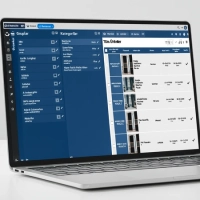
Of course, selling products or goods internationally isn't just about e-commerce. However, since manual methods other than e-commerce are much more laborious and limited, selling internationally through your e-commerce site offers many advantages. Here are some topics you might want to keep in mind to reap these benefits:
Localize Your Website to Sell Internationally
When selling products internationally, you should initially facilitate this by creating a website in your customer base's native language. While English is widely accepted as a common language worldwide, there are still a significant number of people who don't speak English. Therefore, having a website that supports the native languages of your target countries will significantly simplify your international sales efforts. However, don't forget the importance of having employees who speak the language your potential customers might want to contact and who can establish healthy dialogue with them. No matter how effective today's translation technologies are, relying on these tools can damage your corporate identity.
Learn Marketing and Advertising Channels for International Sales
It's important to remember that marketing mechanisms operate differently across different countries and cultures. You should carefully analyze the dynamics of the country you're targeting for international sales. For example, while newspaper advertising may increase brand awareness in one country, online advertising instead of newspaper ads may yield successful results in another. With customized filters like these, you can create marketing and advertising strategies that will boost your international sales success.
Master Your Legal Obligations
Perhaps the most important thing to consider when selling abroad is to thoroughly understand the legal obligations of the country you're selling to. When selling products abroad , you should learn numerous details, including the target country's tax rates, customs regulations, and the content of the contracts between the parties, and apply them to every sale. Otherwise, you could encounter problems like products being held up by customs, packages that should have been returned but never actually arrived, fines imposed on your company by the target country, and many other negative consequences.
Build Your Payment Infrastructure to Sell Goods Abroad
Perhaps the most crucial aspect of an e-commerce ecosystem is the payment system. When a customer likes a product, they add it to their cart, initiate the purchase, and then complete the payment process by entering their credit card information in the relevant form. A key consideration in this standard procedure is whether your payment infrastructure has agreements with the target country's banks. While this usually doesn't pose a problem, it's sometimes possible to encounter infrastructure that blocks bank cards from that country. To avoid such issues and avoid losing potential customers, it's helpful to confirm that the payment infrastructure provider seamlessly works with the relevant country's cards.
Create Your Cargo Logistics Infrastructure
The product sale was easily completed through your e-commerce site, congratulations! After this point, all that's left is the simple step of packaging the requested product and shipping it to the buyer's address. But wait a minute; which company did you choose when shipping to the relevant country? While shipping companies generally ship worldwide today, pricing and shipping times can vary significantly. These companies may also perform sloppy shipping. Therefore, when selling internationally, you should determine which shipping company to choose after researching price, performance, and past user experiences, and inform your customer accordingly.

























